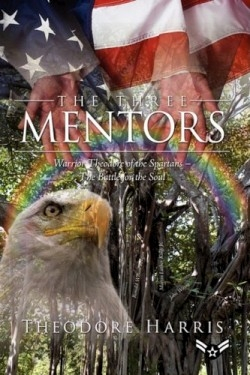The Three Mentors
Warrior Theodore of the Spartans
Martin Luther King, Jr., Ronald Reagan, and John Wayne are the three men Theodore Harris admires most. As a student navigating the social structures of high school, sports teams, and boy scouts, and as an adult betrayed and cheated by the people closest to him, Harris has returned again and again to images of his mentors for strength and inspiration.
Born into tenuous circumstances in Liberty County, Georgia, Harris moves with his family to Buffalo, New York, when he’s only a child. A few years later, when a gang of Hells Angels moves in next door, Harris smoothes neighborly relations by using his greatest weapon: his willingness and ability to talk to whomever happens to be in front of him. The Angels grant him a title, Warrior Theodore of the Spartans, and convince him to spend his life fighting against hypocrisy. From then on, whenever Harris is confronted by racism or bigotry, he remembers the lessons of the Hells Angels.
During Harris’s tenure at Burgard Vocational High School he calls upon his mentors for inspiration in helping him secure peace between the races in his school and on the streets of Buffalo. When offered fame and fortune by the power on high—which may have been President Richard Nixon himself—he refuses to accept any rewards for his good deeds. Instead he devotes himself to a moral life.
Despite his success during his high school years, Harris’s life becomes difficult during his stint in the Air Force. He finds himself tried, tested, and betrayed by many different people and groups, including his own father. Broke and homeless, he eventually manages to regain his spirit and find peace by handing out American flags to children.
Harris’s writing can be very difficult to comprehend. His descriptions of his various adventures are often interspersed with random observations that interrupt the flow of the narrative. For instance, he writes, “That Friday evening I happened to be listening to the radio when Paul Harvey came on with his program called The Rest of the Story. Right away I thought about the lady with the foul mouth talking about her sexual escapades….” Harris never explains the link between the two subjects or reveals any more information about the radio program and its impact on Harris’s problem with the foul-mouthed lady.
Misplaced commas, errant quotation marks, and fragmented sentences all contribute to the sense that Harris doesn’t have a strong grasp on his own story. Because he hasn’t established himself as an entirely trustworthy narrator, readers may have trouble following the plot when he describes his psychic experiences and prophetic dreams.
The Three Mentors is Harris’s attempt to offer his own tale of trial and redemption as a source of hope and faith; sadly, the many problems in the text may keep him from reaching a wide audience.
Disclosure: This article is not an endorsement, but a review. The publisher of this book provided free copies of the book and paid a small fee to have their book reviewed by a professional reviewer. Foreword Reviews and Clarion Reviews make no guarantee that the publisher will receive a positive review. Foreword Magazine, Inc. is disclosing this in accordance with the Federal Trade Commission’s 16 CFR, Part 255.

